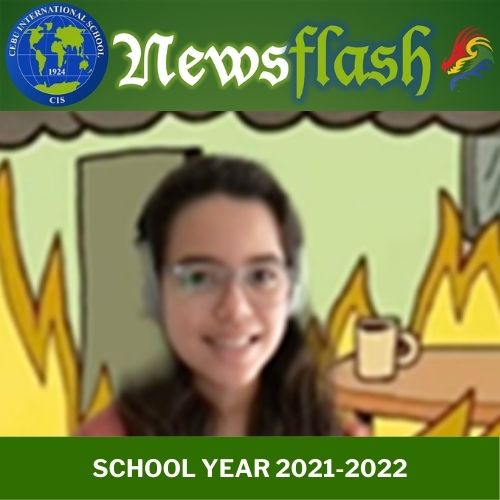
Principal’s Corner
by Mr. Andrew Powell, EY-G12 Principal
A lot of attention has been placed on the way in which we have responded to the various challenges in our lives over the past few months. As a school, we’ve partnered with our families to support our students’ social and emotional wellbeing while also doing our best to support the wider community through our service initiatives. We’ve also continued with our academic programmes despite the obstacles placed in front of us. This has helped to further develop key attitudes and dispositions which are at the heart of our school mission and core beliefs. If I could choose one word to describe our response over the past few months it would be “passionately”.
 Passion comes from one’s purpose. It provides drive and enables us to give our best, no matter the circumstances. Passion provides us with the potential to make an impact on society. It leads to innovation and above all, provides us with hope.
Passion comes from one’s purpose. It provides drive and enables us to give our best, no matter the circumstances. Passion provides us with the potential to make an impact on society. It leads to innovation and above all, provides us with hope.
As a school we provide our students with ample opportunities to develop their passions. We intentionally provide a breadth of subject choice and extra-curricular activities to inspire our students’ hearts, minds and their creativity. We do our best to provide choice, stimulate curiosity, all the while providing students the confidence to see that they can make the world a better place. This also enables us to truly live the IB philosophy of the programs that we offer.
Through the IB programs our students are also provided with a variety of projects and opportunities in which they can engage their passions. In the coming months our Grade 5 students will consider ways that they may best “share the planet” as part of their PYP Exhibition, our Grade 10 students are midway through their extended exploration into a personal project while the Grade 11s and 12s are at different stages of their extended essays. This is a self-driven exploration into a topic of choice in which students are expected to engage in academic research in order to produce a university level paper.
We work hard at fostering an environment that not only produces ideas but also develops character in our students. We know that the experiences our students have at CIS hold them in good stead for the future. Our hope is that they utilize the passion that we have instilled in them to make positive contributions to our ever changing world.
There will be formal opportunities over the coming months to share in our students’ passionate endeavors. Next week it will be our Grade 12 students, as we launch the Grade 12 Extended Essay Cafe. Specific details may be found the article below authored by Ms. Gerri Ancajas Jumao-as and Mr. Jessie Saclo.
Editor’s Note:
-
An Info Brief with an update on our return to campus plans will be sent home on Monday.
- There will be no Newsflash edition next week as it is a 3-day week. The next edition will be out on March 4, 2021.
College Acceptances Class of 2022
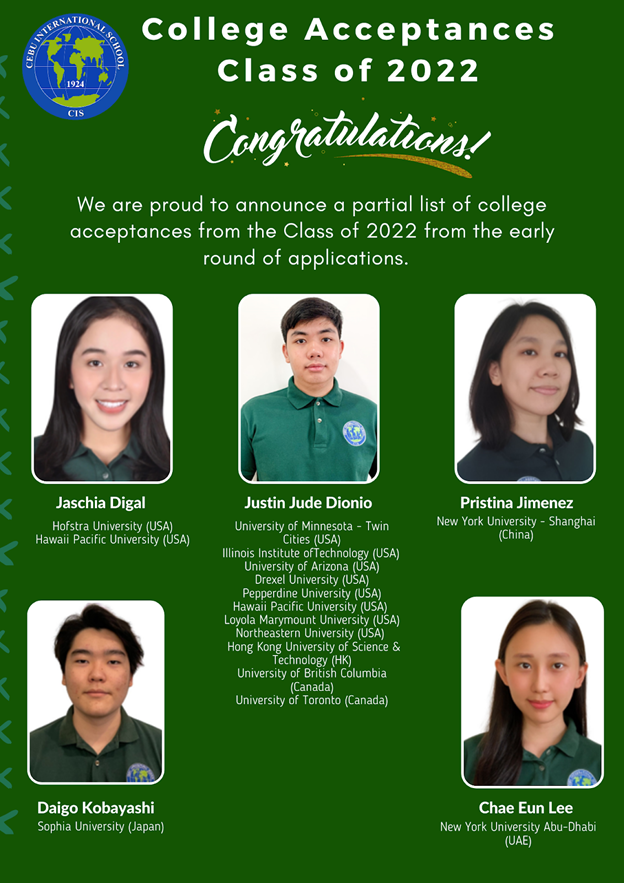
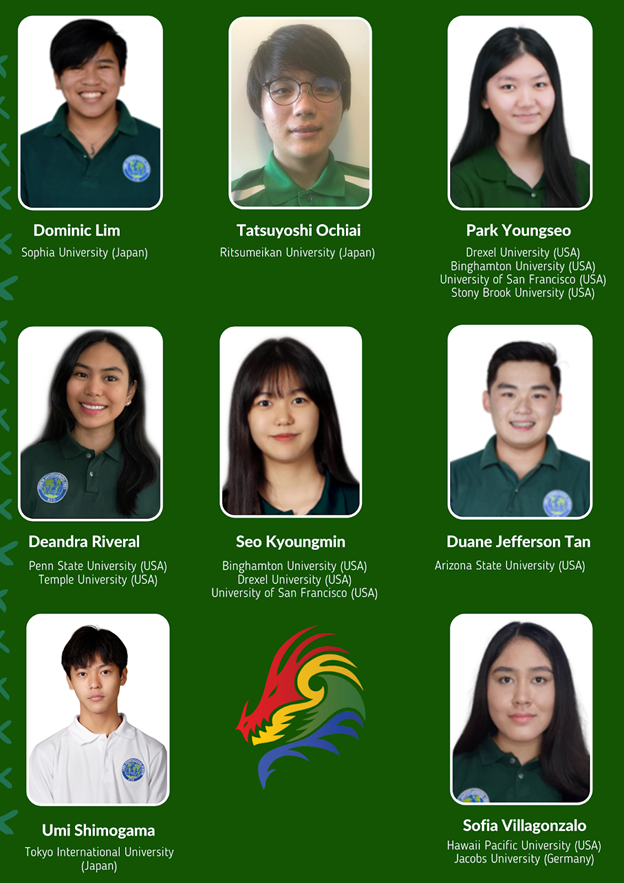
Elementary: Philippine Language and Culture Classes
Early Years
by Ms. Bebelin Tubilan, PLC EY Teacher

How are we different from each other? What are our differences and similarities? Our traits and characteristics? For our Early Years Unit Who We Are, we inquired about ourselves and the people around us. We kicked off the unit by talking about the community helpers who work in the community for its overall well-being. Like them, people inspire others by being good 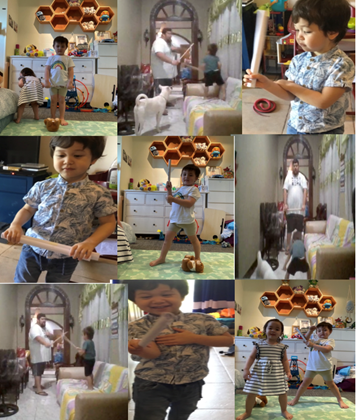 role models or influential people. Influential means someone vital, strong, who makes a big difference in the lives of others. We talked about Manny Pacquiao and his significant contributions to the sport of boxing. Then, we spoke about Remy Presas, the father of modern Arnis. We learned about Arnis, the Philippines’ national martial arts.
role models or influential people. Influential means someone vital, strong, who makes a big difference in the lives of others. We talked about Manny Pacquiao and his significant contributions to the sport of boxing. Then, we spoke about Remy Presas, the father of modern Arnis. We learned about Arnis, the Philippines’ national martial arts.
We talked about the different stances of Arnis: the grip or hawak, the salute or pugay, the ready or handa, the forward stance or pasulong, and the backward stance or paatras. The grip or hawak is how we hold our batons or sticks, the salute or pugay shows respect to our opponent, the ready or handa signs we’re ready to battle, the forward or pasulong is how you attack your opponent, and backward or paatras is what you use to protect yourself from your opponent. We also tried playing Arnis with one of our family members, and we need to hit certain spots to get points. The ulo or head, the stomach or tiyan, and our knees or tuhod.
We will dive deeper and inquire more about the other influential people from the Philippines and some Filipino words in the coming weeks.
Grades 2 and 3
by Ms. Ann Codoy, PLC Elem Teacher
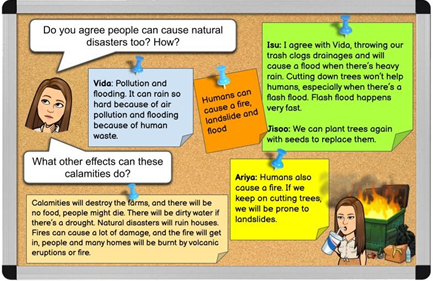 Grade 2 and 3 continued to explore the unit “Where We Are in Place and Time” and focused on Philippine geography. We recently discussed the common calamities in the country and how calamities affect the landforms, water forms, and people. We also talked about how people can cause or contribute to the severity of natural disasters.
Grade 2 and 3 continued to explore the unit “Where We Are in Place and Time” and focused on Philippine geography. We recently discussed the common calamities in the country and how calamities affect the landforms, water forms, and people. We also talked about how people can cause or contribute to the severity of natural disasters.
Moreover, we also shared our ideas on the advantages and disadvantages of living in particular land and water forms.
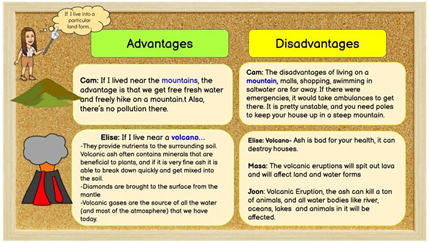
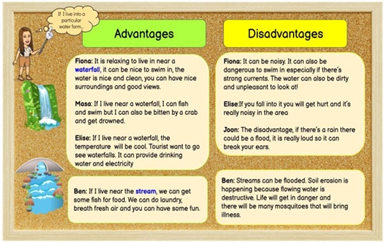
In connection to their awareness of how calamities affect land and water forms and the people, the Grade 3s have made slogans to encourage people to protect and preserve the natural resources in the Philippines and our planet itself.
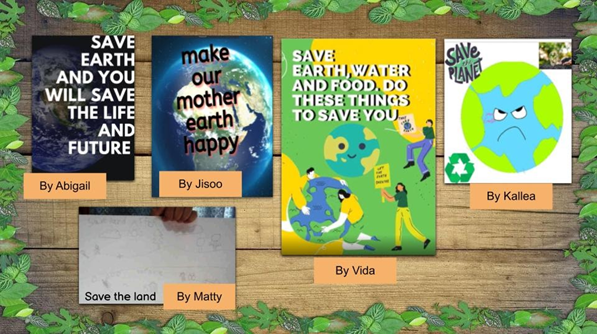
Grades 4 and 5
by Ms. Freshal Abcede, PLC Elem Teacher
Grades 4 and 5 students have been expanding their knowledge and understanding of Philippine culture and how the country functions globally. In our unit “Where We Are in Place and Time,” we began to identify the four cardinal directions (north, east, south, west) to help us locate the different countries on the map and looked into the various landforms and the bodies of water. The students shared the advantages and disadvantages of an archipelagic state which led us to the inquiry into the everyday livelihoods and resources in the country.
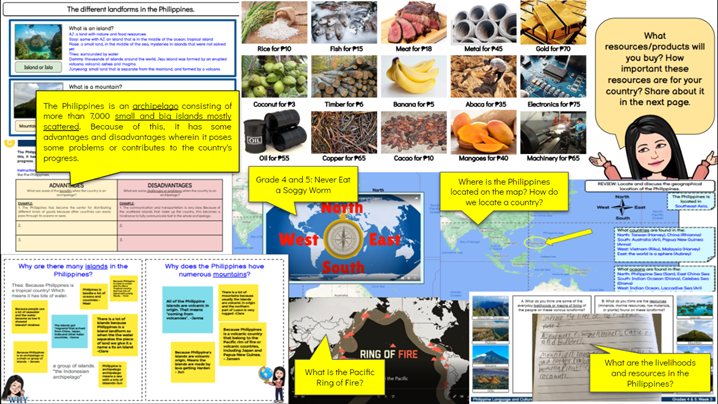
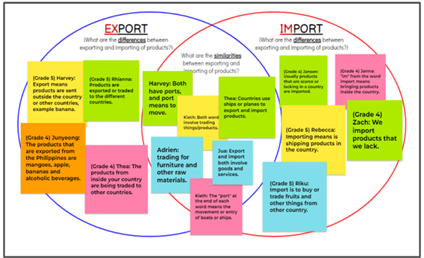 Understanding the words export vs import helped the students connect to our unit further. We learned that the Philippines, specifically in Mindanao, is one of the leading exporters of bananas globally. The students got to discover how they prepared the bananas before the exportation.
Understanding the words export vs import helped the students connect to our unit further. We learned that the Philippines, specifically in Mindanao, is one of the leading exporters of bananas globally. The students got to discover how they prepared the bananas before the exportation.
To further understand how the Philippines functions globally, the students will have the chance to inquire on their own about other resources exported from and imported into the country, and recognize the opportunities and challenges of its geographical location as we end our unit.
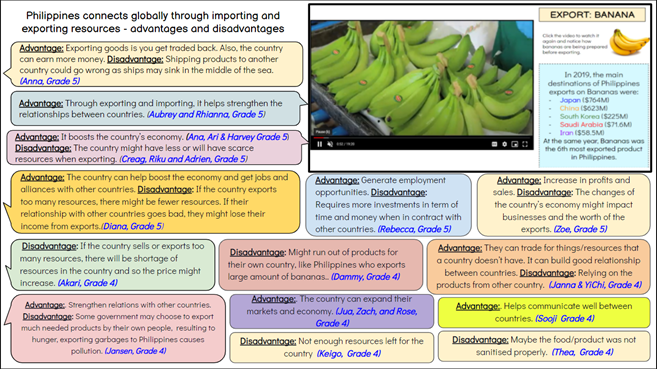
Grade 12: Extended Essay Cafe
by Mr. Jessie Saclo and Ms. Gerri Ancajas Jumao-as, Research Skills Teachers
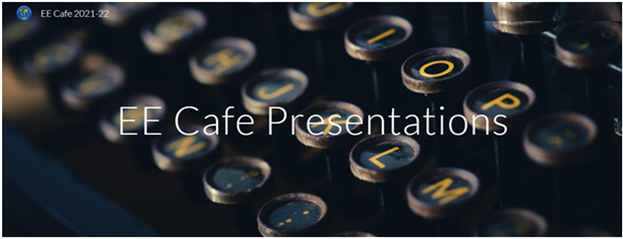
Every Diploma Programme student at CIS embarks on writing the Extended Essay. Students develop a research question, engage in academic research, and write a 4000-word piece. The topic and subject are entirely student choice. Students work closely with a supervisor whose role is to help students develop ideas and processes in completing the essay. The work culminates in the first semester of grade 12. The entire Extended Essay process takes most students 12+ months to complete.
Each year during the EE Cafe, our seniors present their Extended Essay process detailing the experiences, challenges, and successes they have encountered along the way.
Please visit the website to watch and listen to the grade 12 students share an overview of their EE experience which will include their topic and the conclusions they have reached from their research.
Support our seniors and appreciate the hard work they endured these past two years!
Congratulations, seniors!
You can access the videos through this website and here is the link – EE Cafe Presentations
Grade 9: Physics Class
by Ms. Rhea Labajo, MYP Physics Teacher
During Remote Learning Grade 9 students’ discussion focuses on describing what wave motion meant as illustrated by vibrations in ropes, springs and by experiments using water waves. They were able to give the relationship of frequency, wavelength, amplitude and recall and solve problems related to the wave equation. They distinguish between transverse and longitudinal waves and give suitable examples. Properties of waves were also discussed such as reflection at a plane surface, refraction due to change of speed and diffraction produced by wide and narrow gaps.
The Grade 9 students were also asked to define and explore the topics to understand vocabularies, formulas and applications of the concepts and follow a step-by-step procedure to solve problems related to it. Students were asked about their reflection in each topic to assess their understanding.
For them to apply the concepts learned, they were asked to investigate how the speed changes in different depths of water by executing the procedures, observing the ripple across their chosen material using stopwatch, varying the depths of water, calculating the waves across and plotting the graph of their results.
These are some of their output, reflections, and questions during the weeks. Photos and time-lapse were also attached during the investigation.
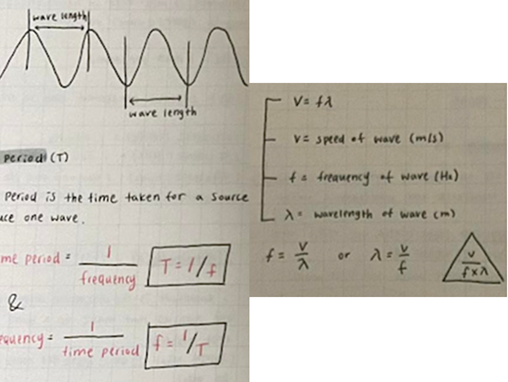
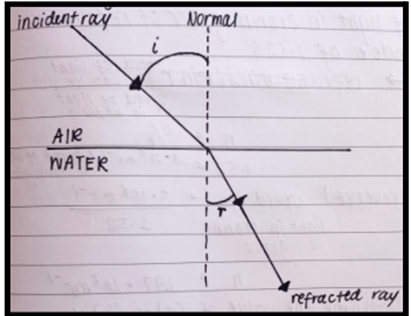


Roland
Aaryan
Adam
Miguel
Sample results of the investigation
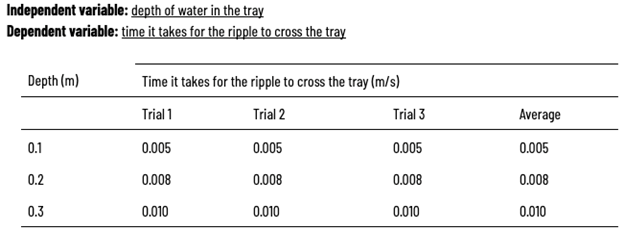
Graph of the investigation
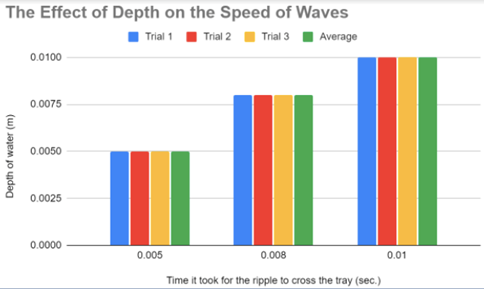
How does the speed of water change in different depths of water? The deeper the water, the faster the waves travel, and the swallower the water, the slower the waves travel.

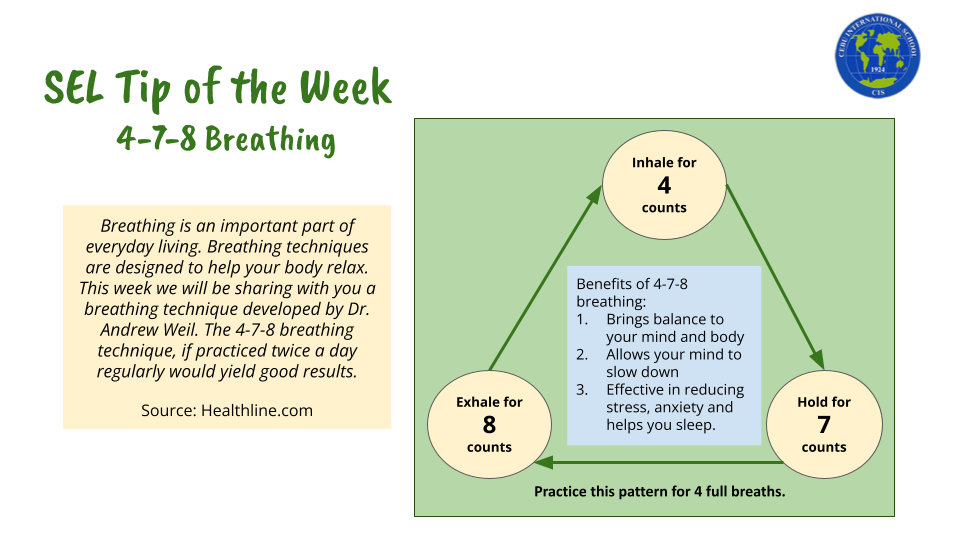
College/Careers Counselor Corner
by Ms. Jenny Basa, College/Careers Counselor
Upcoming Virtual Events and Fairs: (students & parents are welcome)
DATE
February 23 and March 9

February 22
Tuesday
9:00PM PHT
Link to register
American University of Health Sciences (USA)
If you are interested in a health science program, check out this webinar.
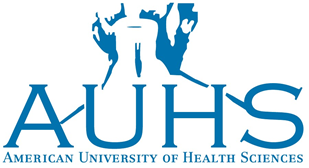
February 22
Tuesday
11:00PM PHT
Link to register
NABA, Nuova Accademia di Belle Arti (Italy)
Live Webinar: DESIGN YOUR FUTURE: 10 Tips for a Good Portfolio –Giorgio Laboratore will share the best tips to make a good portfolio, teaching students how to properly introduce themselves and underline the best of them to outstand the crowd.
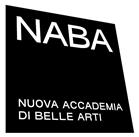
February 24
Thursday
9:00pm PHT
Link to join
Info Session on the EU Business School: On the Way to Geneva! – learn about the Swiss education & lifestyle from a CIS alumnus who is studying in Switzerland.

Feb. 24
Thursday
4:30PM PHT
Link to join
If you are into sport, fitness or wellness, our next episode of the Alumni Chat on Careers may be of interest to you! Join us!
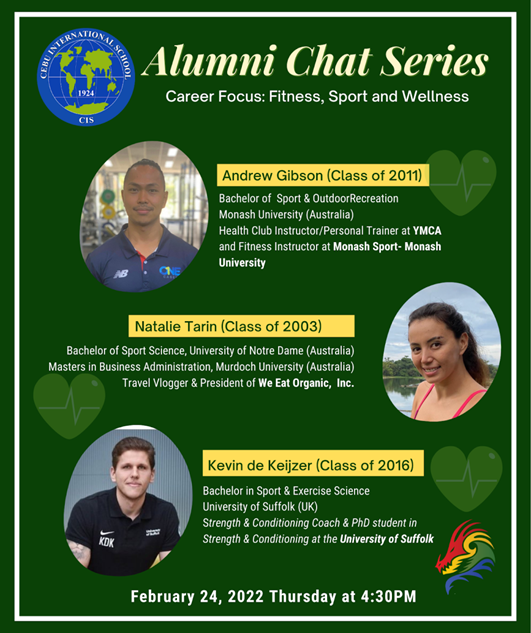
SAT Update
The SAT on March 12, 2022 will push through. All test-takers are advised to bring their vaccination card along with their admission ticket and school ID/passport. If a test-taker is not fully vaccinated (at least 2 doses), a Covid negative PCR test result is required. The sample should have been collected at least 48 hours prior to the test date. The College Board and CIS as the test center is requiring all test-takers to wear a mask at all times. Test-takers without the requirements will not be admitted to the test center.
To register for the SAT, you may click on this link. If you need assistance or have any questions, please feel free to email Ms. Jenny Basa at jbasa@cis.edu.ph.
| 2021-2022 Test Dates | Registration Deadline |
| March 12, 2022 (will push through) | February 11, 2022 |
| May 7, 2022 | April 8, 2022 |
The Optional SAT Essay and Subject Tests have been discontinued.



